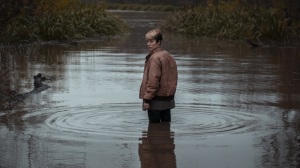The way some filmmakers approach a subject informs the viewer of who they are as a person. Even if they are telling a story that’s of some personal note, making sure their art appeals to a large crowd is typically looming in the back of their mind. However, this seems to be the least of director Brian C. Miller Richard’s concerns for his debut feature film, Lost Bayou. It’s an offering that hits close to home for the filmmaker, but its deep-Cajun roots remain unexploited in a way that most would have taken advantage of.
 Lost Bayou follows Gal (Teri Wyble), a struggling woman whose addiction has estranged her from her young son. She returns back home to the Louisiana Bayou after getting a call from her father (Dane Rhodes) informing her that her mother has died. The audience comes to find out that Gal’s mother died years ago – perhaps by her father’s doing – and the woman whose body lies in her father’s houseboat is a stranger. Gal, frustrated by her father’s apparent delusions but unwillingly wrapped up in the situation, stays with him as they travel downriver to bury her “mother”. After helping a fellow neighbor (Terence Rosemore) recover from a snakebite, we discover that Gal’s father is a faith-healer whose powers are not as consistent as he would hope. His plan to resurrect the body in his home coincides with his wish not only to rejuvenate his relationship with his daughter, but also restore her will for a healthy life.
Lost Bayou follows Gal (Teri Wyble), a struggling woman whose addiction has estranged her from her young son. She returns back home to the Louisiana Bayou after getting a call from her father (Dane Rhodes) informing her that her mother has died. The audience comes to find out that Gal’s mother died years ago – perhaps by her father’s doing – and the woman whose body lies in her father’s houseboat is a stranger. Gal, frustrated by her father’s apparent delusions but unwillingly wrapped up in the situation, stays with him as they travel downriver to bury her “mother”. After helping a fellow neighbor (Terence Rosemore) recover from a snakebite, we discover that Gal’s father is a faith-healer whose powers are not as consistent as he would hope. His plan to resurrect the body in his home coincides with his wish not only to rejuvenate his relationship with his daughter, but also restore her will for a healthy life.
Lost Bayou is quite a unique film from the start. There aren’t many offerings in media that take place in this region of Louisiana, and when they do, they tend to be the butt of the joke. Richard treats his subject matter and setting with respect, as it’s a personal story for him and much of the crew. This is evident in everything from Natalie Kingston’s beautiful, magic-hour focused cinematography and the affectionate yet appropriate score from the Lost Bayou Ramblers. Most of all, however, is its appreciation and love found in the screenplay itself. Deep Louisiana is a character that is never ridiculed, but rather treated with the same respect given to the rest of the cast.
In that regard, the film’s two main subjects are Gal and her father. Gal gets the most screen time, which actress Teri Wyble utilizes in expert fashion. In what could be an overtly melodramatic performance, she handles with utmost subtlety. Her character reacts more often than acts, going along with the events her father finds himself in. Wyble’s performance is quiet and subdued, her ability to get the viewer invested in her character from the very beginning is brilliant. What is more impressive, however, is Dane Rhodes turn as her father. With a thick Cajun accent, Rhodes could have easily portrayed the character as a caricature. However, he portrays the character as he should be portrayed: a flawed human whose concerns for the people around him often outweigh his moral judgment. Rhodes’ performance as the father is powerful in its depiction of desire, guilt, and keeping of faith. Certain award ceremonies probably won’t be open enough to consider this performance, but his work should rank among the year’s best supporting roles.
What is a great asset to Lost Bayou is its handling of the protagonists’ faith healing powers. A common practice in the area, its inclusion in the film could have easily been the main focus. An entire premise dedicated to a man trying to right his wrongs with the help of faith healing is one that could certainly draw an audience but would most likely push the father-daughter dynamic to the side. It could have even been approached with a horror influence, especially the scenes involving writer and producer Hunter Burke’s character. In his first few scenes comes a reveal that changes the plot. Most filmmakers would insert elements such as jump scares to heighten the tension, but Richard chooses a different route. Instead, he gives the viewer the information they need to know without dwelling on it. The surprise involved and even the faith healing itself is not the focus of the picture; it’s the relationship between Gal and her father. Richard never dwells from this and it’s admirable filmmaking.
Lost Bayou is a treat that audiences should try their best not to let go under the radar. The cast is excellent and Richard’s directing is inspiring. It’s the setup for a truly interesting career that will hopefully continue a tradition of telling stories distinct to local cultures.


Sweet heart warming, unique and bizarre in a good way…….it was like falling in love slowly. Loved this film
LikeLike